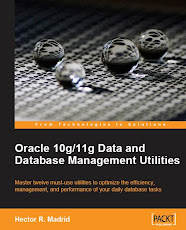Market Share WarAfter the Oracle's announcement to release OEL, Redhat suffered a 700 million dollars loss of profit, as its shares felt 24%, which can be interpreted in sever al ways as market analyst have stated.
Oracle may be looking to buy it and it is expecting to lower the market share price, so the strategy could be to strangle Red Hat until it has no more oxygen to breath, as since the announcement, the share fell,having the investors stampede in october 2006 when more than 113 million shares had changed hands, compared to the daily average of 6 million. The share reached its bottom price of $15.71 usd. Today it closed at $19.81 usd per share
[Ref. 1] but this cannot be compared with the $24.71 usd it reached in the past.
The StrategyWith the announcement, Oracle gets to steal the leading product directly from the leading Linux vendor and package it as part of the application stack they sell. And yes many sites want a single support point for the whole thing.
Edward Screven, Oracle's CTO, said:
"We think it's important not to fragment the market. We will maintain compatibility with Red Hat Linux. Every time Red Hat distributes a new version we will resynchronize with their code. All we add are bug fixes, which are immediately available to Red Hat and the rest of the community. We have years of Linux engineering experience. Several Oracle employees are Linux mainline maintainers." [Ref. 2]Why Oracle isn't the clone of another distro, or even more, why Oracle didn't create its own Oracle distro from scratch when it has the money and the people?
This introduces another message between lines. Oracle will be a high fidelity Red Hat clone because Oracle is hunting Red Hat,
it is easier to eat it if it already fits inside.
Why it is betterAs Larry Ellison stated on the Open World announcement, he cited a range of problems with current Linux support:
- True Enterprise Support Unavailable from Linux Vendors
- Support from Leading Linux Vendors is Expensive
- No intellectual Property Indemnification from Linux Vendors
Oracle thinks it can do better on service levels:
- Dedicated linux development, test, and delivery teams
- Backed by world's largest software support organization
- Ready 24x7
- 145 countries and 27 languages
[Ref. 3]So, where does this leave us? It will be interesting to see how Red Hat responds. Red Hat is still the premium provider of Linux, that's true so this complicates things, but doesn't significantly change them.
ConclusionI don't think the day when Oracle will announce the end of support for RHEL will ever come, I think Oracle will do another Block buster buy with Red hat, and it will wipe off the name of red hat and replace it by Oracle Enterprise Linux, alias the Unbreakable Linux.



